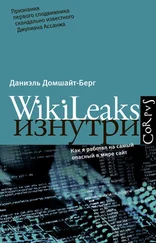Harding, Luke - WikiLeaks - Inside Julian Assange's War on Secrecy
Здесь есть возможность читать онлайн «Harding, Luke - WikiLeaks - Inside Julian Assange's War on Secrecy» весь текст электронной книги совершенно бесплатно (целиком полную версию без сокращений). В некоторых случаях можно слушать аудио, скачать через торрент в формате fb2 и присутствует краткое содержание. Жанр: Старинная литература, на английском языке. Описание произведения, (предисловие) а так же отзывы посетителей доступны на портале библиотеки ЛибКат.
- Название:WikiLeaks: Inside Julian Assange's War on Secrecy
- Автор:
- Жанр:
- Год:неизвестен
- ISBN:нет данных
- Рейтинг книги:3 / 5. Голосов: 1
-
Избранное:Добавить в избранное
- Отзывы:
-
Ваша оценка:
- 60
- 1
- 2
- 3
- 4
- 5
WikiLeaks: Inside Julian Assange's War on Secrecy: краткое содержание, описание и аннотация
Предлагаем к чтению аннотацию, описание, краткое содержание или предисловие (зависит от того, что написал сам автор книги «WikiLeaks: Inside Julian Assange's War on Secrecy»). Если вы не нашли необходимую информацию о книге — напишите в комментариях, мы постараемся отыскать её.
WikiLeaks: Inside Julian Assange's War on Secrecy — читать онлайн бесплатно полную книгу (весь текст) целиком
Ниже представлен текст книги, разбитый по страницам. Система сохранения места последней прочитанной страницы, позволяет с удобством читать онлайн бесплатно книгу «WikiLeaks: Inside Julian Assange's War on Secrecy», без необходимости каждый раз заново искать на чём Вы остановились. Поставьте закладку, и сможете в любой момент перейти на страницу, на которой закончили чтение.
Интервал:
Закладка:
Assange saw his role as that of a chief executive. His job was to monitor WikiLeaks’ vast footprint in cyberspace, and to keep in touch with the organisation’s collaborators in the other jurisdictions and time zones. Smith says: “He is obsessed with his work. Julian needs to understand what is written about WikiLeaks and the story. He describes it as monitoring the temperature.”
To the right of the fireplace was a striking portrait of Vaughan Smith’s great-great-grandfather, “Tiger” Smith. Smith acquired his sobriquet after killing 99 tigers, lugging many of them back to Ellingham Hall. Two stuffed beasts sat in glass boxes; others had been chucked out after mouldering. The entrance lobby was decorated with crossed sabres, old rifles with bayonets and other memorabilia from forgotten colonial skirmishes. There was a stuffed deer head, a pair of antlers, and a large painting depicting two stags charging furiously towards each other against an unusual pistachio background. If an American film director wanted the quintessential English country pile for his period movie, he could hardly have done better than Ellingham.
The WikiLeaks team quickly adapted to the rituals of English country house life. Ellingham Hall had a housekeeper; there was a kitchen with a raised central square table where staff would make meals; chops and sausages were piled up in a cardboard box. The estate had an organic farm (whose produce was also served in the restaurant of the Frontline Club back in London). Vaughan Smith had a decent cellar – its contents selected by the former Guardian wine critic Malcolm Gluck. At mealtimes Assange and his co-workers sat in Smith’s splendid dining room beneath a venerable circular table. There was port – passed to the left by the cyber-radicals, in accordance with English convention. Assange insisted that nobody drank more than a glass a night, forcing his companions to cut side deals with the kitchen staff.
Assange’s own habits were ascetic: he paid little attention to what he ate. His otherworldliness extended to his wardrobe. He didn’t appear to possess any clothes of his own. At one point the WikiLeaks team decided Assange needed to remove himself from his screen and take some exercise. They bought him a red Adidas top: once a day Assange would jog through the parkland – a flash of brightness in a rural palette of browns and greens. Soon, Smith would transmogrify Assange further into the more muted shades of a country gentleman: he lent him a green parka and the tweed jacket with asymmetrical pockets that Smith had worn as a (trimmer) young man of 19. Assange also tried his hand at fishing.
From the outside few would have guessed what was really going on inside Ellingham Hall’s high bay windows. Assange had gone to ground in this way, like a fox, because he was preparing, along with the Guardian and four other major international papers, to broker publication of the most spectacular leak in history. He had confided he was a little scared. There had been nothing like it, not even the Pentagon papers – the publication of the secret record of America’s war in Vietnam – almost 40 years earlier. At one point the local hunt clattered across the grounds of Ellingham Hall; huntsmen and hounds crashing through the Spion Kop woods. It was the kind of pursuit that Assange seemed to sense he was involved in. Was he, too, the hunted animal, with prosecutors and US intelligence agents the red-coated huntsmen, riding to the sound of a blowing bugle, surging closer and closer?
CHAPTER 2
Bradley Manning
Contingency Operating Station Hammer,
40 miles east of Baghdad, Iraq
November 2009
“ I should have left my phone at home ”
LADY GAGA
After the punishing heat of summer, Iraq in November is pleasantly warm. But for the men and women stationed at Camp Hammer, in the middle of the Mada’in Qada desert, the air was forever thick with dust and dirt kicked up by convoys of lorries that supplied the capital – a constant reminder that they were very far from home. One of those was Specialist Bradley Manning, who’d been sent to Iraq with the 2nd Brigade Combat Team, 10th Mountain Division a few weeks earlier. About to turn 22, he was the antithesis of the battle-hardened US soldier beloved of Hollywood. Blue-eyed, blond-haired, with a round face and boyish smile, he stood just five feet and two inches tall and weighed 105 pounds.
But he hadn’t been sent to Iraq because of his bulk. He was there for his gift at manipulating computers. In the role of intelligence analyst Manning found himself spending long days in the base’s computer room poring over top-secret information. For such a young and relatively inexperienced soldier, it was extremely sensitive work. Yet from his first day at Hammer, he was puzzled by the lax security. The door was bolted with a five-digit cipher lock, but all you had to do was knock on it and you’d be let in. His fellow intelligence workers seemed to have grown bored and disenchanted from the relentless grind of 14-hour days, seven days a week. They just sat at their workstations, watching music videos or footage of car chases. “People stopped caring after three weeks,” Manning observed.
After a few months Manning had grown scathing about the culture of the base. “Weak servers, weak logging, weak physical security, weak counter-intelligence, inattentive signal analysis … a perfect storm,” he would later write. He approached the National Security Agency officer in charge of protecting information systems and asked him whether he could find any suspicious uploads from local networks. The officer shrugged and said, “It’s not a priority.”
It was a culture, as Manning later described it, that “fed opportunities”. For Manning, those opportunities presented themselves in the form of two dedicated military laptops which he was given, each with privileged access to US state secrets. The first laptop was connected to the Secret Internet Protocol Router Network (SIPRNet), used by the department of defence and the state department to securely share information. The second gave him entry to the Joint Worldwide Intelligence Communications System (JWICS), which acts as a global funnel for top-secret dispatches.
That such a low-level serviceman could have had apparently unrestricted access to this vast source of confidential material should surely have raised eyebrows. That he could do so with virtually no supervision or safeguards inside the base was all the more astounding. He would spend hours drilling down into top-secret documents and videos, wearing earphones and lip-synching to Lady Gaga. The more he read, the more alarmed and disturbed he became, shocked by what he saw as the official duplicity and corruption of his own country. There were videos that showed the aerial killing from a helicopter gunship of unarmed civilians in Iraq, there were chronicles of civilian deaths and “friendly fire” disasters in Afghanistan. And there was a mammoth trove of diplomatic cables disclosing secrets from all around the world, from the Vatican to Pakistan. He started to become overwhelmed by the scale of the scandal and intrigue he was discovering. “There’s so much,” he would later write. “It affects everybody on earth. Everywhere there’s a US post there’s a diplomatic scandal that will be revealed. It’s beautiful, and horrifying.”
From there it was but a short step to thinking that he could do something about it. “If you had unprecedented access to classified networks 14 hours a day, seven days a week for eight-plus months, what would you do?” he asked. What he did, it is alleged, was to take the rewritable CD which carried his Lady Gaga music and erase it, then copy onto the disc other, far more dangerous, digital material. He was about to embark on a journey that would lead to the largest leak of military and diplomatic secrets in US history.
Читать дальшеИнтервал:
Закладка:
Похожие книги на «WikiLeaks: Inside Julian Assange's War on Secrecy»
Представляем Вашему вниманию похожие книги на «WikiLeaks: Inside Julian Assange's War on Secrecy» списком для выбора. Мы отобрали схожую по названию и смыслу литературу в надежде предоставить читателям больше вариантов отыскать новые, интересные, ещё непрочитанные произведения.
Обсуждение, отзывы о книге «WikiLeaks: Inside Julian Assange's War on Secrecy» и просто собственные мнения читателей. Оставьте ваши комментарии, напишите, что Вы думаете о произведении, его смысле или главных героях. Укажите что конкретно понравилось, а что нет, и почему Вы так считаете.












